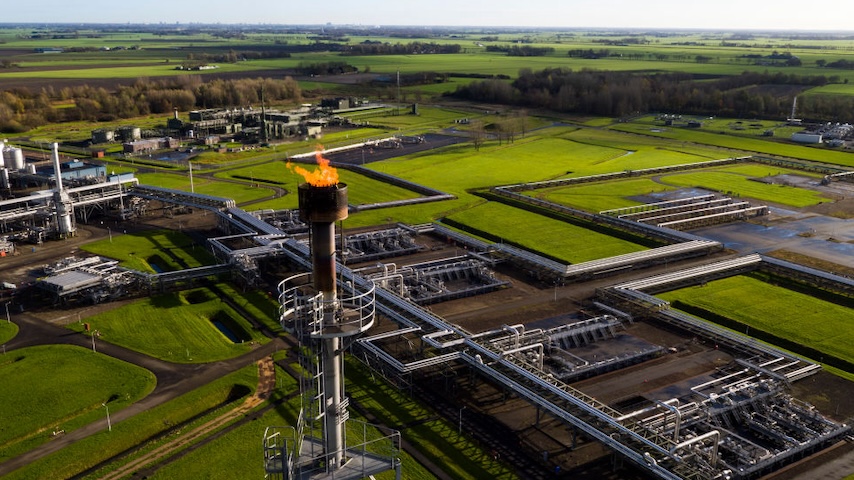Big Oil Will Exploit This Trillion-Dollar Loophole Until Someone Closes It
Photo by Cris Toala Olivares/Getty Images
In 2012, the Dutch village of Huizinge, near the country’s northern coast, was shaken by a 3.6 magnitude earthquake. This is not, generally speaking, a seismically active area, but this was one of more than a thousand relatively small quakes recorded in the region over the last few decades. The culprit behind these shakes is the largest fossil gas field in Europe.
Since its discovery in 1959, an ExxonMobil and Shell partnership has pulled gas and dollars out of the Groningen gas field. As a result, this little corner of a place already called the Low Countries has sunk by a foot or more, and the earthquakes have weakened buildings and turned the public against the industry. The Dutch government decided enough was enough in the 2010s, and forced a reduction in gas extraction beginning in 2013; in 2019, it said the end of Groningen gas production would come in 2022.
They missed that deadline by only a bit, halting most production by late 2023 and all of it in April of this year, just after the Dutch Senate approved a law to permanently close the gas field. This was, in general, a popular move — a 2020 survey from Pew found the Netherlands had the lowest public support for expansion of natural gas drilling out of 20 countries, at only 38 percent against a median of 69 percent. Even in the face of the supposed fossil gas crunch thanks to Russia’s invasion of Ukraine, few want to restart the earthquake machine in one of the more climate change-vulnerable places around.
Among that few who do: the oil companies themselves. Or, if they won’t be allowed to restart the gas spigot, they at least want to be paid for the trouble.
This month the Exxon-Shell consortium (technically a company called NAM) filed a lawsuit against the Dutch government known as an investor-state dispute settlement, or ISDS. They claim that the government under former prime minister Mark Rutte took “unilateral measures that arbitrarily disadvantaged ExxonMobil as an investor” — they closed the gas field, and we don’t get to make money anymore.
-

-

-

-

-

-

-

-

-

-

-

-

-

-

-

-

-

-

-

-

-

-

-

-

-

-

-

-

-

-

-

-

-

-

-

-

-

-

-

-

-

-

-

-

-

-

-

-

-

-

-

-

-

-

-

-

-

-

-

-

-

-

-

-

-

-

-

-

-

-

-

-

-

-

-

-

-

-

-

-

-

-

-

-

-

-

-

-

-

-

-

-

-

-

-

-

-

-

-

-

-

-

-

-

-

-

-

-












































































































